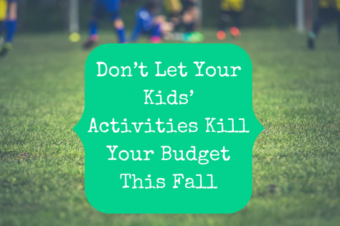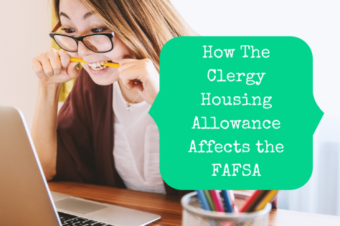
Families and college students all over the country fill out the FAFSA to apply for financial aid. But what can you do if you aren’t awarded enough aid to go to the school of your choice?
It’s that time of year again! No, I’m not talking about blueberry picking. I’m talking about 18-year-olds all over the country eagerly checking their email for a link to their FAFSA Student Aid Reports and the ensuing panic as the whole family tries to figure out how to pay for college.
That time of year. We’re less than a month out from the start of the term for many colleges and universities and a lot of people still don’t know how they’re going to pay. They’ve seen their Student Aid Report, but many didn’t receive the aid they expected. What now?
What Is FAFSA?
If you haven’t been around the college scene lately, you may not even know what FAFSA is. It stands for Free Application for Federal Student Aid. It’s a government form that college students fill out to see what kind of federal financial aid they are eligible for. Though it is a federal form, many states and private aid providers also use it to determine eligibility.
The FAFSA requires a bunch of information about the student and the student’s parents and their finances. Based on that information, an Estimated Family Contribution is calculated. The Estimated Family Contribution is what the government thinks your family can reasonably pay towards college. They subtract that from the cost of the college you plan on attending and the result is how much aid they think you need.
What Kind Of Financial Aid Can You Get With FAFSA?
So, what kind of financial aid can FAFSA get you? And the big question, do you have to pay it back?
There are three kinds of aid that filling out the FAFSA can provide you with; scholarships and grants, loans, and work-study. Scholarships and grants are free money. Loans have to be paid back. Work-study is a job, where you work in exchange for money. Some of the names you will see are Pell Grants and Federal Supplemental Educational Opportunity Grants (which you don’t have to pay back), Perkins Loans, Stafford Loans, and Plus Loans (which you do have to pay back), and Federal Work-Study jobs.
Those are the forms of federal aid that you apply for with the FAFSA. You may have other opportunities with your state, school, or through a scholarship program.
What If You Don’t Get Enough Aid?
Here’s the big question, what happens if you get your Student Aid Report and it’s not enough to pay for college? That happens to a lot of people, me included. If that happens to you, here are your options:
Family
Hit up your family for money. Sometimes family members like grandparents like to help out their grandkids with their tuition. Or, they might be willing to loan money, to be paid back after graduation.
If you really want to borrow money, a family member may be able to co-sign on a loan. If the parents’ credit isn’t good enough to get a PLUS loan, then the student would be eligible for more aid, about $4,000 more for a freshman.
Private Loans
If the maximum government loans available are not enough, you could get a private loan. Most people only do this after taking out all of the government loans they are eligible for because they have less favorable terms. Many private lenders don’t lend to college freshmen, so it would be up to the parents to take out the loan (and pay it back).
Go To A Cheaper School
When I was headed to college, I said, “My mom has no money, so I’m going to community college!” I honestly didn’t even know student loans existed, and I’m so glad! I looked at my resources, saw what I could afford, and went with it. And I’ve never struggled under the weight of student loan debt as so many of my peers have.
While it may be difficult to change plans just weeks before school starts, you have to look at the long-term ramifications. It’s not just the debt, but how the debt will affect your life. Will you have to put off marriage and children because of your debt load? Will you have to take the highest-paying job possible even if you hate it? Is all of that worth the difference between your school of choice and a cheaper option?
Utilize Credit-By-Exam
If going to a cheaper school is just not an option, what about earning cheaper credits at the school of choice? Many schools allow you to study independently and take an exam for credit, for about $100 per class. You could save up to $4,000 or $5,000 per class! For more information on different kinds of credit-by-exam, read this blog post.
Work
The FAFSA does not assume that the student is working (unless they offer work-study). I’ve earned two Bachelor’s degrees, and I don’t see any reason why every college student can’t work. Even my friends who studied something highly technical, like engineering, had no trouble working at least part-time while they were in school.
In today’s job market, anyone who will show up sober should have no trouble getting a job. I was just talking to someone today that was complaining that he can’t find people to fill multiple open positions with a starting pay of $17 an hour. Whether you work during school or postpone school for a year while you work and save up, work is always a good solution to money problems.
What Would I Do?
It probably comes as no surprise that I would work and go to a cheaper school (which is what I did). I don’t think any specific school justifies jeopardizing an entire family’s finances. If it’s this hard to pay for the freshman year, what are you going to do about year 2, 3, and 4? Each year will only get worse. (And if this is your first kid, what about kids number 2, 3, and 4?)
Also, just because a student starts at a certain school doesn’t mean they will finish there. The tight financial situation could force them to transfer schools or even quit. Then you have the expensive-school debt without the expensive-school degree. It would be much better to go to a cheap community college for two years, get the hang of college courses and discover the direction you want to take, then transfer to that expensive dream school with your degree half done and no debt to speak of.
And you? What have you done to pay for college? What are you doing for your children to help them?



